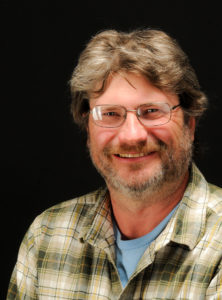
Michael Petronis
Las Vegas, N.M. – A Highlands University geology professor will help lead a nationwide National Science Foundation panel to determine grant funding for geoscience research.
Michael Petronis will serve at NSF’s Earth Sciences: Instrumentation and Facilities funding meeting Nov. 17-18 in Berkeley, California.
“Our responsibility is to critically evaluate the grant proposals in terms of intellectual merit and broader impacts on society, and then make recommendations for funding,” Petronis said. “My geoscience panel will be allocating approximately $6 million to universities throughout the U.S.”
The Earth Sciences: Instrumentation and Facilities program at the National Science Foundation funds university research instrumentation and student research opportunities across the spectrum of sciences such as geology, biology, chemistry, physics and geophysics.
“I will bring the knowledge I gain from serving on this NSF panel back to Highlands to assist other faculty and students to further their skill sets to write successful research proposals,” Petronis said.
Petronis was selected from scientists across the country to serve on the NSF geophysics panel based upon his track record of securing more than $1.6 million in research and instrumentation grants from the NSF for Highlands. He co-authored a number of the proposals with Jennifer Lindline, a fellow geology professor and head of the Natural Resource Management Department.
Petronis said collaborating with other scientists from throughout the country brings recognition to Highlands.
“Leading this national NSF geoscience panel helps raise the profile of our small Hispanic-serving university in rural Northern New Mexico,” Petronis said.
The other NSF panelists are from large research institutions such as the University of Minnesota, Colorado School of Mines, Boston College, Georgia State University, and University of Alaska.
While in Berkeley, Petronis will also be part of a team of scientists that will evaluate the performance of the Lawrence Berkeley National Laboratory’s Advanced Light Source Division.
Petronis has gained an international reputation for his research in volcanology, ancient global climate change, mineral and material magnetism, and regional tectonic plate studies.
His research is widely published in scholarly publications such as Nature Geosciences, Journal of Geophysical Research, Bulletin of Volcanology and Geothermal Research, Earth and Planetary Science Letters, and Journal of Petrology.
At Highlands, Petronis directs the university’s state-of-the-art Paleomagnetic-Rock Magnetic Laboratory to study magnetic properties of earth materials, with a focus on environmental, geological, and archaeological applications.
Since 2009, Petronis and his students have used the paleomagnetic lab for 31 research studies published in scholarly journals such as the Journal of Geophysical Research, Nature Geosciences, and Bulletin of Volcanology. Petronis and Lindline’s students were lead authors on 15 of these studies.
To date, the Highlands paleomagnetic lab research has also generated more than 80 conference abstracts, most authored by students. In addition, the lab has supported more than 14 Highlands’ graduate student research projects as well as numerous undergraduate research projects.
